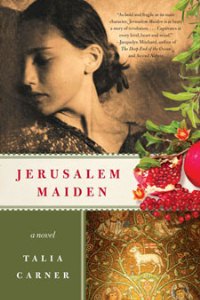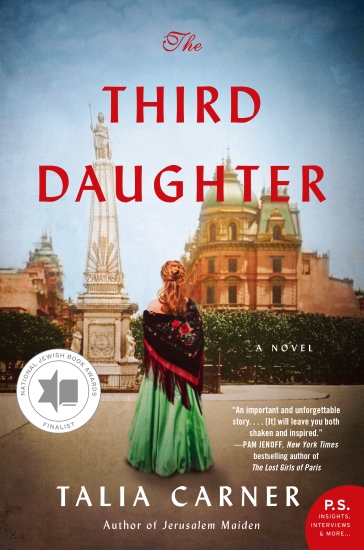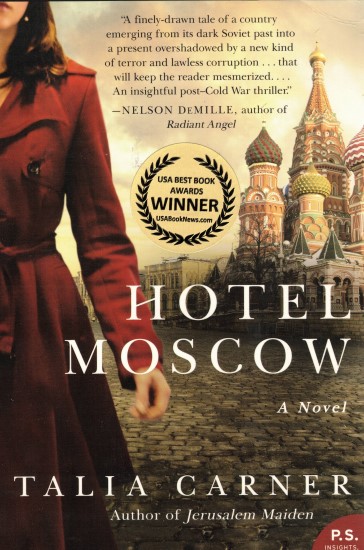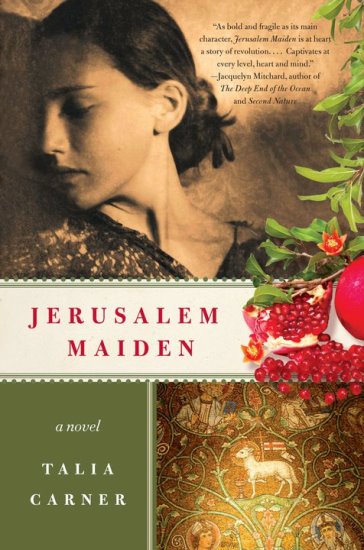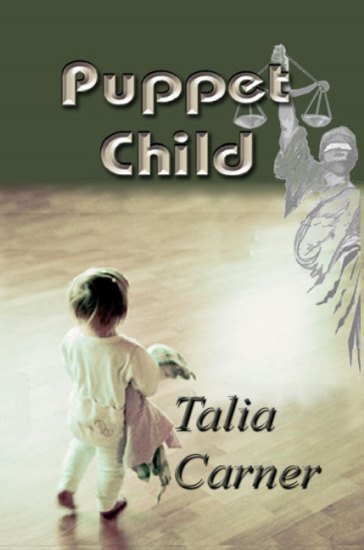Although painstaking attention was given to the text to ensure that every foreign word or concept—Hebrew, Yiddish, French, or Arabic—was explained in the context immediately as it was introduced, below is a list for those wishing to further check the words.
(Please note: unless mentioned otherwise, the words are in Yiddish or Hebrew1 )
A
A shandeh un a charpeh — Shame and disgrace.
Aba — Daddy, father.
Adon — Master.
Adonai — God. (Orthodox Jews do not utter Yehowa name; instead they use Adonai or Hashem.)
Alte zachn — A street merchant of cast off clothes and furniture. Considered a disrespected occupation.
Amalek — The name of an historical enemy of the Jews.
Ankuken — A peek.
Ashkenazi — Jews who came from Eastern European countries.
B
Ba’al — Husband, owner.
Balabuste — A skilled homemaker.
Bar mitzvah – A religious ceremony in which a boy who turns 13 becomes an adult member of the community. (For girls, bat mitzvah, is traditionally at 12 and is not celebrated.)
Baksheesh — (Arabic) A tip, an unofficial payment for service, a gift of money.
Berachot — Prayers, blessings.
Bima — Podium. A respected spot in front of the synagogue’s ark.
Birkat Hagomel — A blessing of thanks upon arrival on overseas or dangerous travel.
Boocher — Lad, young man. (Mostly refers to Talmudic student.)
Boulangerie — (French) Bakery.
Burqas — (Arabic) full head covering, including a veil.
C
Chador — (Arabic) A tent-like cover for women from head to toe with only an opening for the eyes.
Challah — A braided white bread baked especially for Shabbat and holidays.
Chazan — Cantor.
Cholent — A Saturday casserole prepared ahead of time, thus requiring no desecration of the holy day to cook.
Chupah — A wedding canopy.
Cloche — (French) Bell. Refers to the shape of a woman’s hat.
D
D’accord — (French) OK, fine.
Dieu — (French) God.
Diligence — (English?) A passenger carriage service.
Doven (also Daven) — To recite a prescribed prayer, often while swaying the body.
Dvar Torah — An inspiring ethical elucidation of a Torah passage told to listeners.
Dybbuk — Possessed by insanity. Obsession by another soul and acting through it.
E
Eeluy — Genius.
En plein aire — (French) In open air.
Eretz Yisrael — The biblical land of Israel.
Erev tov — Good evening.
F-G
Falachs — (Arabic) farmer.
Fedayeen — (Arabic) Arab guerrillas operating especially against Israel.
Gefilte fish — Stuffed fish dish.
Gevalt — Immense. A cry of anguish, suffering, frustration, or for help.
Goy — Gentile, not of the Jewish faith. (Not derogatory.)
Goyim — Plural of goy, a gentile.
Goyishe — Belongs to gentiles, goy-style.
Grush, Grushim (plural) — Ottoman currency. (One hundred grushim in a lira.)
H
Havdalah — Prayer service separating the Shabbat from the start of the week.
Haggadah — A booklet of the tale of the Jews’ exit from Egypt, (Exodus) read at dinner on the eve of the eight-day festivity of Passover.
Halacha — The collective corpus of Jewish rabbinic law, custom and tradition. (SEE NOTE #2 BELOW)
Halitza — A religious ceremony in which a brother of a childless deceased man forgoes his obligation to father a child on the dead man’s behalf.
Halvah — (Arabic) A textured sweet made of sesame seeds.
Hamsa — (Arabic) Five. Refers to a talisman of hand, often with signs etched into it and a large eye in the center.
Hamssin — (Arabic) Fifty. The early-summer blistering, dry days of winds blasting desert sand.
Haredi — The ultra-Orthodox community as it calls itself. (Literally: Tremble in fear before God.)
Hashem — His Name, God, when uttering His name orally.
Hassids — A branch of Orthodox Judaism that promotes spirituality and joy and popularized Jewish mysticism.
I-J-K
Ima — (Pronounced “eema”, the “i” as in Mina) Mommy, mother.
Incroyable — (French) Amazing.
Jolie — (French) Pretty.
Kaffiyehs — (Arabic) Arab men’s headdress, usually in checkered black and white.
Kibbutznik — A person living in a kibbutz.
Kiddush — Friday or holiday night blessing for the wine.
Kinders — Children.
Klal — Community.
Kleyzmer — Musician.
Kol isha — The sound of a woman’s voice.
Kosher — According to strict Jewish dietary laws, the most know are the separation of meat and dairy products and not eating shellfish.
Kreplach — A dumpling filled with ground meet or chicken and folded into a triangle.
L
Le’chaim — To life. A salutation.
Levantine — Of the Levant, the large area in Southwest Asia bounded by the Mediterranean Sea in the west, and the north Arabian Desert and Mesopotamia to the east.
Li’tzor — To create.
Lizol — Undiluted disinfectant, highly corrosive.
Loofah — The fibroid skeleton of a cylinder gourd that, once dried, it is used as a sponge.
M
Mai pour quoi? — (French) But why?
Maman — (French) mother.
Mamzer — Illegitimate child. In Judaism, the term strictly refers to a child of a married woman from a man who is not her husband, (and is therefore subject to a variety of social and religious exclusions). The term is loosely applied to a child of an unmarried woman.
Mangal — (Arabic) stove.
Matzo — A saucer-sized cracker-like unleavened bread, eaten during Passover to commemorate the Israelites’ exodus from Egypt.
Mazal Tov — Good luck.
Merci beaucoup — (French) Thank you very much.
Meshigas — Idiosyncrasies, craziness.
Meshuggah — Crazy.
Metzi’ah — Bargain, a find.
Mezuzah — A miniature hand-scripted holy parchment scroll mounted on the threshold of a Jewish home.
Mikveh — A central bath house, where, at separate times women and men take their ritual bath by fully dipping over their head under religious supervision. Women are particularly obligated to preserve their purity after their monthly period.
Merveilleux — (French)
Mishnah — Early commentary on Jewish oral law, supplementing the written law of the Bible. (SEE NOTE #2 BELOW)
Mitzvah — A good dead, decree. (In other context: a decreed coitus.)
Mon chou — (French) A term of endearment to a child. (Literally: “my cabbage.”)
Muezzin — (Arabic) The spiritual Muslim leader who calls for prayer from the top of a minaret.
N-O
Narghiles — (Arabic) Plural of “narghila.” A bottle-like smoking device with brass parts and a gummy pipe in which boiling water and tobacco are used.
Nidah — Menstruating time and the week afterward for purification. (Literally, “excommunication.”)
Nigun, Nigunim (plural) — Wordless tunes.
Nu — An expression of urgency: C’mon, let’s go, well?
On y va — (French) Let’s go.
Oy vey iz mir — Woe is me.
P-Q-R
Parashah — The weekly reading of a Torah portion delineated by a topic rather than chapter breaks.
Pe’os — Sidelocks, side curls.
Pikuach nefesh — The principle in Jewish law that the preservation of human life overrides any other religious consideration.
Ponchkes — Chanukah’s fried soft dough balls filled with jelly.
Quotidien — (French) Of daily occurrence. Common.
Reb — Mister. A form of address to a man.
Rebbetzin — The rabbi’s wife.
Rodef — A pursuer; someone whom it is permissible or required to kill before he kills.
Rosh Hodesh — The first day of the month.
S
Schlepping — Carrying, lugging.
Schnorrers — Beggars or scroungers.
Sepharadi — Jews who came from Arab and Muslim countries (originating in Spain).
Shalom — Peace. A word of welcome or goodbye.
She’ol — Underworld.
Sherwal — (Arabic) Cotton pants with generous material gathered between the legs around the knees.
Shiddach — Matchmaking.
Shiksa — A non-Jewish woman. (Not derogatory.) The female of “goy.”
Shiva — The ordained seven days of mourning.
Shmaltz — Chicken fat.
Shochet — Kosher butcher.
Shofar — Made of ram’s horn, this blow trumpet is used mostly on Yom Kippur to open the sky for the prayers.
Siddur — The prayer book containing a set order of prayers by the day, week, holiday.
S’il vous plait — (French) Please.
Souk — (Arabic) Market, bazaar.
Sofer — A scribbler, calligrapher of sacred books.
Sou — (French) A coin of low denomination.
Sulcha — (Arabic) A forgiveness ceremony.
T-U-V
Tallit — A prayer shawl men wear when praying.
Tefillin — Phylacteries. Leather straps and two small prayer boxes used by religious men in their prayer ritual.
Tichel — A headscarf worn by married Jewish women in compliance with the code of modesty.
Traife — Not kosher. Not in compliance with Jewish dietary observance laws.
Tzadeket — A righteous woman, one involved in great charitable deeds.
Tzedakah — Charity, good deed.
Tzena U-re’ena — A book of Jewish lore and biblical stories.
Tzitzi’yot — A four-corner garment with twisted threads at the corners meant to remind a Jew about God’s commandments. Men wear it under their outer clothes, with the twisted threads showing.
Tzni’us — Modesty.
Tzuris — Troubles.
W-X-Y-Z
Wadi — (Arabic) A dry creek, river bed.
Yahud — (Arabic) A Jew.
Yarmulke — A small, round skullcap.
Yeled — A child.
Yeshiva — A religious school.
Yeshiva boocher — A scholarly student of religious studies.
Yetzer — Urge, impulse, passion.
Yi’chud — Together alone, private commune of a married couple. (Can also refer to any man and woman who find themselves alone in the same room.)
Yishmor Hashem — Heaven forbid.
Yortzeit — Anniversary of someone’s death.
Yotzer — The Creator.
Notes:
- Haredi — The ultra-Orthodox community (Haredi) sees itself as the link to the giving of the Torah to Moses at Mount Sinai. As there is no distinction between religious and non-religious life, the written law (Torah) and oral law (Halacha) guide not only religious practices and beliefs, but every aspect of day-to-day life, from the moment a Jew wakes up to the moment he goes to sleep.
- Talmud, Torah, Mishnah, Gemara, Halacha — The Torah is the written law given to Moses at Mount Sinai, while the Halacha is the collective corpus of Jewish rabbinic law, custom, and tradition and includes codes of behavior applicable to virtually every imaginable circumstance (and many hypothetical ones), which have been pored over throughout the generations. The earliest written compilation of Halacha, the Talmud, is an authoritative record of rabbinic discussions on Jewish law, Jewish ethics, customs, legends and stories. The Talmud has two components, the Mishnah, and the Gemara, a discussion of the Mishnah by the sages (though the terms Talmud and Gemara are generally used interchangeably), is considered authoritative. Later commentaries on the Mishnah were redacted as the Gemara. The Mishnah and the Gemara together form the Talmud. Both written law and oral law are the subjects of intense study in religious schools known as yeshivas.
1Yiddish is derived from German, while Hebrew is a Semitic language. Nevertheless, many Yiddish words and concepts are borrowed from Hebrew, but with the different pronunciation. (e.g., In bima, chupah, or yichus, the accent in Yiddish is on the first syllable while in Hebrew it’s on the last.)
Author’s note appearing at the end of the novel:
Haredi, “those who tremble in awe of God,” also known as ultra-Orthodox, consider themselves the Jewish people’s emissaries to the Holy City and devote their lives to worshipping God. They maintain strict codes of behavior to guard against secular influences and reject all other streams of Judaism. Particularly, they reject Jewish nationalism, which believes in Jews’ right for cultural and political independence in the land of their forefathers—a concept known as Zionism—since such independence can only be obtained with the coming of the Messiah. Today, one small Haredi group, Neturei Karta, actually aligns itself with the Arabs in calling for the dismantling of the State of Israel.
In the late nineteenth century and early twentieth century, the Haredi helped build new neighborhoods outside Jerusalem’s city walls to alleviate overcrowding in the Old City. In one of them, Me’ah She’arim, the story of Jerusalem Maiden begins.
The time of the novel, starting in 1911, is the end of the four-hundred-year rule of the Ottoman Empire (1517–1917). The decline of the Ottoman rule manifested itself in widespread governance disintegration, corruption, and neglect. Much of the land was owned by absentee landlords, and taxation was crippling and capricious. Forests were denuded of trees, while spreading swamp and desert encroached on dwindling agricultural land.
At the height of its power (sixteenth–seventeenth century), the Ottoman Empire spanned three continents, controlling much of Southeastern Europe, Western Asia and North Africa. Starting in the mid- to late nineteenth century, various Western powers jockeyed for position, often through missionary activities. They opened consulates in Jerusalem and brought progress. They established their own postal services and steamship lines between the Holy Land and Europe. They built the first railroad from Jaffa to Jerusalem and opened the Suez Canal as a crossroads for commerce among three continents. Consequently, in the late eighteen hundreds, the condition of the country’s Jews improved and their numbers increased substantially. They purchased land for farming throughout the country, established new Jewish rural settlements, and revived the Hebrew language, long restricted to liturgy and literature. In 1910, Jerusalem’s population reached 73,600, of whom 47,400 were Jews, 16,400 were Christians, and 9,800 were Muslims.
The outbreak of World War I found the frayed Ottoman Empire battling its many fronts. Arabia rose against the Turkish rule, and British forces occupied Baghdad and Jerusalem. In 1918, the Ottoman Empire came to an end. Forty countries were formed by its collapse. In 1922, following the British Balfour Declaration of 1917, the League of Nations entrusted Great Britain with the mandate to establish in Palestine a national home for the Jewish people.
